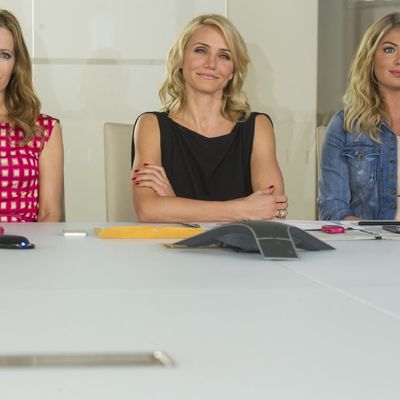
A montage-happy, occasionally unpleasant film that’s still strangely watchable, The Other Woman is almost saved by a cast that’s … well, likable isn’t quite the word. Cameron Diaz hasn’t even tried to be likable in years. After her turns as a mechanophiliac bitch-on-wheels in last year’s The Counselor and the title role in 2011’s dark rom-com Bad Teacher, it’s hard to think that she was ever that sweet girl-next-door-whom-everybody-wanted in There’s Something About Mary. Now, with her Amazon frame and a seemingly permanent half-scowl on her lips, she seems like she was always destined to play antiheroes and/or heavies.
But as The Other Woman starts out, Carly, Diaz’s alpha-female corporate lawyer (“a ruthless law robot,” her assistant Nicki Minaj calls her), is happy, smitten — and a victim. The object of her affection, and the cause of her betrayal, is Mark (Nikolaj Coster-Waldau), a handsome, romantic venture capitalist who, over the course of a few weeks, makes Carly’s otherwise-committed single feel like she may have finally found the One. Unfortunately, Mark also happens to be married, seemingly happily, to Kate (Leslie Mann). He’s been living an elaborate double life — one that Carly uncovers when she makes a surprise late-night visit to his Connecticut home.
Now Carly’s dark side shows itself. As vulnerable, innocent Kate tracks down and confronts her at her law firm, Carly grows cold. She doesn’t want anything to do with Mark anymore, but she definitely doesn’t want anything to do with his overemotional wife, either. (Carly doesn’t like to show feelings: “Cry on the inside, like a winner” is her mantra.) That’s a fascinating dynamic, made especially compelling by Mann’s energetically histrionic antics, but it doesn’t last. They have a mutual interest now, so they become friends and allies. Then they discover a third woman — a dim, twentysomething bikini babe named Amber (Kate Upton) — and away we go. It’s time to deliver some Hollywood justice to the philandering Mark. Which, of course, means intricate poop jokes.
The Other Woman doesn’t practice what it preaches. You’d think a film about feminine solidarity and empowerment would find some time to let its female characters interact, but so much of their bonding happens over montages that you may rightly wonder what they’re talking about most of the time. Ironically enough, when they do talk, the film seems very much to be a man’s vision of what betrayed women might talk about — namely, men, and their own relative attractiveness with respect to said men. (Once Upton shows up, Diaz flies into a jealous rage at this younger woman who is clearly a newer model of her. “If you play tennis with John McEnroe, you’re gonna lose,” Mann tells her when they first see Upton. “I AM McEnroe!” Diaz yells.)
They do seem to be enjoying themselves, however. Diaz clearly relishes poking holes in her rock-solid stiletto-babe persona, and Mann is a gifted physical comedienne, occasionally unleashing tornadoes of slapstick. As a result, while not particularly laugh-out-loud funny, The Other Woman has just enough verve to keep us somewhat engaged. Still, you can’t shake the feeling that in a just world, all these women — even Kate Upton — would have better material than this.


